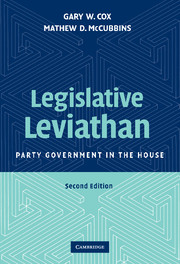Book contents
- Frontmatter
- Contents
- List of Figures
- List of Tables
- Acknowledgments
- Legislative Leviathan
- Introduction
- PART ONE THE AUTONOMY AND DISTINCTIVENESS OF COMMITTEES
- PART TWO A THEORY OF ORGANIZATION
- 4 Institutions as Solutions to Collective Dilemmas
- 5 A Theory of Legislative Parties
- PART THREE PARTIES AS FLOOR-VOTING COALITIONS
- PART FOUR PARTIES AS PROCEDURAL COALITIONS
- PART FIVE PARTIES AS PROCEDURAL COALITIONS
- Conclusion
- Appendix 1 Uncompensated Seniority Violations, Eightieth through Hundredth Congresses
- Appendix 2 A Model of the Speaker's Scheduling Preferences
- Appendix 3 Unchallengeable and Challengeable Vetoes
- Appendix 4 The Scheduling Power
- Bibliography
- Author Index
- Subject Index
5 - A Theory of Legislative Parties
Published online by Cambridge University Press: 05 June 2012
- Frontmatter
- Contents
- List of Figures
- List of Tables
- Acknowledgments
- Legislative Leviathan
- Introduction
- PART ONE THE AUTONOMY AND DISTINCTIVENESS OF COMMITTEES
- PART TWO A THEORY OF ORGANIZATION
- 4 Institutions as Solutions to Collective Dilemmas
- 5 A Theory of Legislative Parties
- PART THREE PARTIES AS FLOOR-VOTING COALITIONS
- PART FOUR PARTIES AS PROCEDURAL COALITIONS
- PART FIVE PARTIES AS PROCEDURAL COALITIONS
- Conclusion
- Appendix 1 Uncompensated Seniority Violations, Eightieth through Hundredth Congresses
- Appendix 2 A Model of the Speaker's Scheduling Preferences
- Appendix 3 Unchallengeable and Challengeable Vetoes
- Appendix 4 The Scheduling Power
- Bibliography
- Author Index
- Subject Index
Summary
Definitions of political parties have been offered from two main perspectives: one emphasizing structure; the other, purpose. The structural perspective defines parties according to various observable features of their organization. Studies of the historical development of parties, for example, take pains to distinguish “premodern” parties from “modern” ones, typically by pointing to the increasing elaboration of extraparliamentary structures in the latter (Duverger 1954; LaPalombara and Weiner 1966). The purposive approach, in contrast, defines and categorizes political parties by the goals that they pursue. Typical examples include Edmund Burke's definition of a party as a group of men who seek to further “some particular principle in which they are all agreed” (Burke 1975, 113); Schattschneider's definition, whereby a political party is “an organized attempt to get … control of the government” (Schattschneider 1942, 35); and that of Downs, whereby “a political party is a team of men seeking to control the governing apparatus by gaining office in a duly constituted election” (Downs 1957, 25).
Neither the structural nor the purposive definitions of parties are suited to the needs of this chapter. The structural definitions take as defining features the kinds of things that we hope to explain. Moreover, these definitions generally turn on extraparliamentary organization rather than on the intraparliamentary organization that is our main concern. The purposive definitions of party, on the other hand, assume too much about the internal unity of parties.
- Type
- Chapter
- Information
- Legislative LeviathanParty Government in the House, pp. 99 - 126Publisher: Cambridge University PressPrint publication year: 2007



